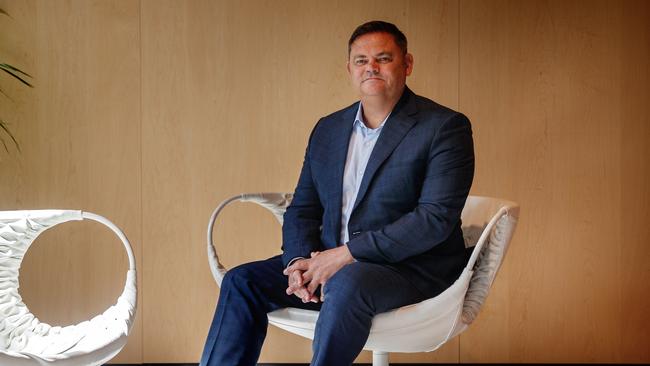Accenture CEO Peter Burns: Business is on cusp of reinvention
Consulting boss Peter Burns says the coming year will see AI move from experimentation to enterprise scale.

Economy
How would you rate the momentum of the Australian economy as we head into 2025? Official forecasts have Australia trimming interest rates from the first half of calendar 2025, is that consistent with your view? What are you seeing around inflation in your own business?
Most business leaders I’ve been meeting with are fairly pragmatic about the macro-nvironment going into 2025. There is a sense that any uplift will be modest, with inflation pressures still at play in Australia, but hopefully moderating in New Zealand. Across all sectors, productivity continues to be a challenge, and this also impacts the hip pockets of the majority of Australians. Australia’s real wages are 4.8 per cent lower than pre-pandemic levels, one of the largest drops recorded among OECD nations. Raising our productivity levels not only lifts our economy – it lifts our standard of living and wellbeing.
To achieve growth in this challenging environment, many of our clients are looking to reinvent their businesses through large transformations, while cutting costs at the same time. We’re also seeing a big focus on talent and the development of future-ready skills, which is a great thing for the nation. The other big consideration in this context is, of course, the role of AI and automation in driving productivity. Our research found that gen AI could create AUD$419 billion in economic value in Australia by 2038, equivalent to 0.75 per cent boost in annual GDP growth.
Outlook
What excites you heading into 2025? Are you likely to increase, hold steady, or trim your investment spend?
We anticipate that 2025 will be the year that AI moves from experimentation to enterprise scale, and we’re already seeing some emerging leaders in this space, particularly in the financial services, resources and telecommunications sectors. At Accenture, we talk about AI as the next “digital”, and it will be truly transformative: our research shows AI will enable productivity enhancements across more than 900 different types of jobs, reducing many mundane tasks and freeing people to take on higher value work. However, technology on its own cannot achieve this. Every investment in technology also requires an equal investment in people. In 2023, Accenture invested $3B in our data and AI practice to help our clients reinvent their businesses and we continue to invest in upskilling our 770,000+ people around the world. This investment will continue into 2025 and beyond, as we create our future workforce.
Reform
As we move into an election year, in your mind, what’s the single biggest lever that can/should be used to lift Australia’s competitiveness or productivity? This could be across any area from labour market, tax reform, training or other areas to encourage investment.
I’m a big believer in incentives that foster dynamism, innovation and entrepreneurship to help capture our natural competitive advantages as a nation. In terms of productivity, investment in technology must be at the top of the list of levers we can pull. No matter which sector or industry you consider, there are gains to be made by implementing the cost and timesaving technologies that are now readily available. For example, in the industrials and energy sector, there is much value to be created by streamlining asset management, achieving better safety, better predictive maintenance and self-healing systems. In an area like health, patient service can be improved, and our frontline health workers can be unburdened from repetitive manual tasks like paperwork. The possibilities for productivity gains are endless, if we take a long-term view and invest in the technology and workforce skills that will make it happen.
Geopolitics
Will a Donald Trump presidency have a potential impact on your business or sector (tariffs or streamlined regulation)? Does geopolitics drive a bigger part of your decision-making?
Regardless of any nation’s leadership, many of our clients are understandably considering the possible impact of geopolitical events on their organisations given the turbulence we’ve all experienced this decade. The uncertainty carries both risk and opportunity — the opportunity is how we lean into a new era of digital manufacturing aligned to our competitive strengths, provide greater capital certainty and tap innovation.
The trend towards deglobalisation is a challenge for any nation that is competitive and reliant on trade, as Australia is, so we do see this impacting decision-making, and sparking an interest in nurturing domestic, new and neighbouring markets. Many of our clients are also still recovering from the impact of the Pandemic and are working to strengthen the resiliency of their supply chains accordingly. At the same time, security is increasingly top of mind for our clients in both the private and public sectors, and at Accenture we are expanding our domestic capabilities to meet demand for sovereign delivery of AI, operations and technology services.
People
Has your organisation’s approach to flexible working – including working from home – evolved during the year. Is this likely to change further into 2025?
To attract the best talent, we need a healthy and productive workplace culture, so our commitment to fostering that culture will continue as we move into 2025. Globally, 85 per cent of our people at Accenture say they feel empowered to work flexibly, which means not just where they work, but how they work and what they do. However, we also encourage our people to build relationships and connections in person, particularly between our more senior and junior team members. Mentoring is a fundamental part of our business and essential to bringing through the next generation of talent. We also ask our people in client-facing roles to take the lead from our clients and mirror their ways of working, and to prioritise in-person meetings and collaboration.
Technology
Where is your organisation along the AI journey – is it in the developmental stage, or are you now using the technology at scale across your business? If so, are benefits matching the promise?
Because we like to think of Accenture as our own best credential, we are already using AI at scale across our business. To facilitate this, we have invested heavily in our digital core and our technology infrastructure is more than 95 per cent in the Cloud. We’ve embedded AI across our service delivery approach, driving efficiency, insights, and accelerating value for thousands of clients through our market leading platforms such as myWizard, SynOps, and MyNav. Six years ago, we pioneered our own Responsible AI framework, which is now part of how we deliver work for our clients, and underlies our rigorous AI compliance program. The benefits are already paying off, and this is something we’re able to demonstrate to our clients who are considering adopting the same approaches.



To join the conversation, please log in. Don't have an account? Register
Join the conversation, you are commenting as Logout